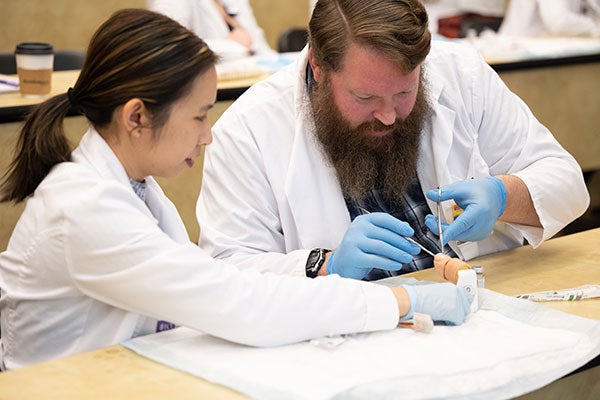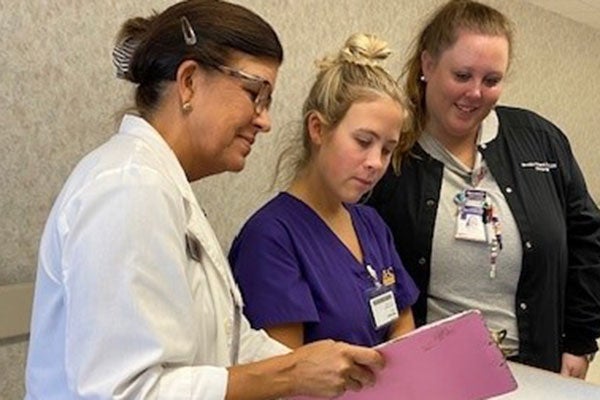
A host of opportunities led Anderson to future career paths
East Carolina University and ECU Health are launching an initiative to increase the number of adult geriatric acute care nurse practitioners who work as advanced care practitioners in critical care settings at ECU Health. This effort builds on the collective commitment of both organizations to solve rural health challenges in the region as well as the state.
This effort — designed by nursing and education leaders from ECU’s School of Nursing and Health — will benefit the university and health system, said Dr. Bem Akintade, dean of ECU’s School of Nursing. An investment of nearly $1.5 million over five years from ECU Health will increase the College of Nursing’s capacity to graduate trained, qualified nurses who can meet the growing need for acute care practitioners to treat the hospital’s sickest patients.
Brooke Rowan, a medical oncology nurse specialist at ECU Health, is pictured with her mentor, Kelly Jones, a clinical assistant professor from ECU’s School of Nursing, and Riley Veasey, a nursing student.
“ECU Health is proud of our close relationship with ECU and the College of Nursing, especially regarding our efforts to adapt to the national health care workforce shortage,” said Dr. Daphne Brewington, vice president of nursing at ECU Health. “Our success as an academic health system depends on our ability to leverage clinical and academic excellence in order to ensure our ability to deliver high-quality health care to the people of eastern North Carolina.”
Nationally, the population of older people is increasing, accompanied by a shortage of health care workers. This collaboration not only strengthens the healthcare workforce in eastern North Carolina, but also contributes to improved health outcomes and increased access to specialty care for older adults in eastern North Carolina communities.
Through this effort, ECU Health is helping to fund the development of a new Adult Geriatric Acute Care Nurse Practitioner graduate certificate, which will train current nurse practitioners to treat adult patients in acute care. The investment also provides funding for the program director who teaches and an additional part-time faculty member as well as administrative support and operational costs.
The program will reserve six registrations per registration cycle for existing ECU health staff, highlighting the importance of providing specialist training that benefits the region.

Advanced practice nursing students practice skills in the College of Nursing.
“Our plan is to spend the next few months working with our partners at ECU Health and finding clinical placement sites in critical care settings for ECU Health employees who enroll in the program,” Akintade said. “They need nurses, and training nurses is our business and our passion. This is a win-win collaboration that makes perfect sense for the university, health system, region and state.”
Clinical placements for students working at ECU Health will be conducted in ECU Health facilities, which will help alleviate a major point of contention for advanced practice nurse training – finding clinical placements for students in training. It also has the potential to create pathways for those in the program to experience acute care at both the ECU Health Medical Center and at ECU Health’s regional community hospitals.
The initiative is not limited to the current arrangement, and both ECU and ECU Health continue to explore ways to leverage this effort to design innovative solutions that benefit the people of eastern North Carolina.
“Eastern North Carolina relies on organizations like ECU Health and ECU to collaborate on innovative solutions that advance our mission of improving health and well-being in the region,” said Dr. Trish Bice, Chief Nursing Officer at ECU Health. “As a health system serving 1.4 million people, we need more nurses at all levels in order to meet the region’s tremendous needs. The College of Nursing is one of the best nursing education schools in the country, and our health system is a great training ground for care workforce development “Healthcare with a focus on rural health challenges. I’m excited to see the benefit this program will bring to our patients and team members.”
East Carolina University’s School of Nursing and ECU Health have partnered to create the Open Academic Practice (OAP) Partnership, a groundbreaking initiative focused on improving healthcare outcomes through innovative education and research. This partnership represents a collaboration between academia and healthcare providers, aiming to bridge the gap between theory and practice in the field of nursing. The OAP Partnership seeks to create a synergistic relationship between nursing education and clinical practice, ultimately benefiting both students and healthcare practitioners. With a focus on academic excellence and evidence-based practice, this partnership is poised to make a meaningful impact in the healthcare community.

